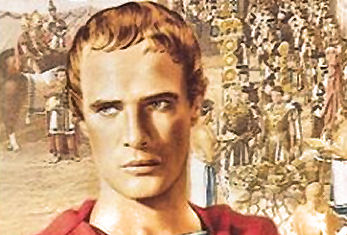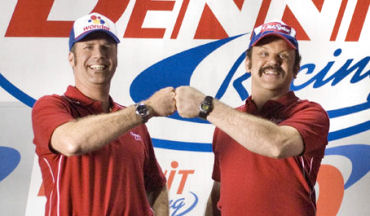9/11 Comfort Blanket
Oliver Stone’s World Trade Center (Paramount, 8.9) is a well made, emotionally satisfying rescue movie. It happens to be about a couple of Port Authority cops (played by Nicolas Cage and Michael Pena) who got buried in the rubble of 9/11, but it could be about any two family men who nearly buy it while doing a tough job on a bad day.
It’s pretty much as screenwiter Andrea Berloff described it three or four months ago — a boy-down-the-well movie only darker and with blood and bruises and crushed bones, and times two. Not the most striking or labrynthian or emotionally complex film you’ve ever seen, but a good one.
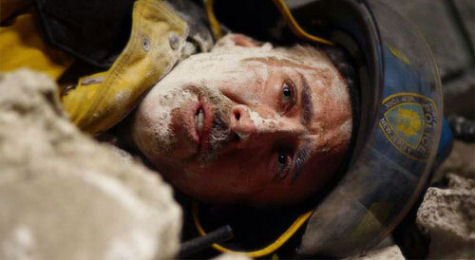
Nicolas Cage as John McLoughlin in Oliver Stone’s
World Trade Center It’s spookier and less talky and certainly more traumatic than Ron Howard’s Apollo 13, but it’s basically the same thing. Brave guys get caught in it, seem fucked, are fucked, families think they’re fucked, a nervy guy with smarts and ingenuity is determined to save them, he finds a way, brave guys aren’t fucked after all and they’re home free and out. Otherwise there are loads of differences between Stone’s and Howard’s film, and one that stands out in particular: Apollo 13 has a more interesting story and a much stronger second act.
World Trade Center is about two guys trapped in a dark hole full of rocks and dirt and twisted metal, and the audience definitely shares their plight in the middle section. A feeling of being enveloped by despair and then hopelessness, a sensation of oxygen depletion, of being trapped with life slipping away. If this weren’t a grim-up-and-pay-attention 9/11 movie and was just an original script, agency readers would be writing the same thing all over town: “Great beginning, good ending…and a second act that literally lies there.”
< ?php include ('/home/hollyw9/public_html/wired'); ?>
Stone has directed World Trade Center like a champ and made it into something sharper and more shaded than what it probably was on the page. It could have been television — the bones are straight out of a made-for-TV movie manual — but it’s not. Nor is it the Second Coming. But because of the 9/11 baggage factor it’s being called a knockout and a cathartic wowser by both Time and Newsweek this week. And it’s not. Or at least, it didn’t feel that way to me.
By my standards World Trade Center is a solid 7.8. Not quite an 8, but absolutely nothing for anyone on the team not to be proud of, or at least very content with. I have no significant beefs with this film. I’d be surprised if anyone does. It’s not the kind of movie that will tick anyone off. It’s too decent and restrained and respectful and sharply rendered. But in a ground-rule-double sort of way.
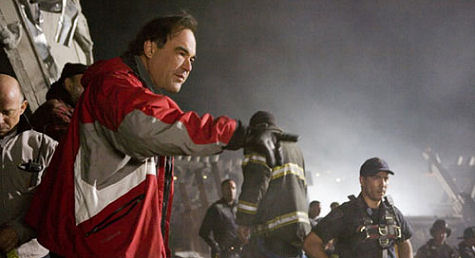
Oliver Stone on Playa del Rey set of
World Trade Center It’s very well acted up and down (Nicolas Cage, Maggie Gyllenhaal and Stephen Dorff are the best of a uniformly pro-level cast). The sense of 9/11 realism is bracing all the way through, and the visual effects are top-notch, by which I mean nearly invisible. (There’s an overhead shot of the smoldering World Trade Center site on Tuesday, 9.12, that’s one of the best non-fake-looking CG shots I’ve ever seen.) I really have to hand it again to Stone for doing an excellent job of “getting out of the way” and just directing it like a no-nonsense pro — as if the spirit of Anthony Mann swirled up from the grave and took over.
I think it’s fine that the patriotic right-wing community has been shown World Trade Center in advance screenings and that they’re digging it and all. I can see why. It has no politics, no Hollywood leftie attitude — it’s just a straight drama about a lot of good people pulling together to save a couple of guys from the jaws of death. A movie about caring, family, duty, perseverance.
Everybody knows Cage plays Port Authority cop John McLoughlin and Pena plays Will Jimeno, right? Two real-life guys who had to go through dozens of operations to recover from their 9/11 injuries, and who’ve been helping to promote the film that last several weeks.
The Newsweek story, written by critic David Ansen, says that World Trade Center “celebrates the ties that bind us, the bonds that keep us going, the goodness that stands as a rebuke to the horror of that day. Perhaps, in the future, the times will call for more challenging, or polemical, or subversive visions. Right now, it feels like the 9/11 movie we need.”
Not very challenging or polemical, and yet Newsweek has World Trade Center on the cover. It sounds like the editors might have been the ones doing cartwheels in the lobby rather than Ansen. Boil the snow out and all he’s saying is that WTC is classy emotional therapy.
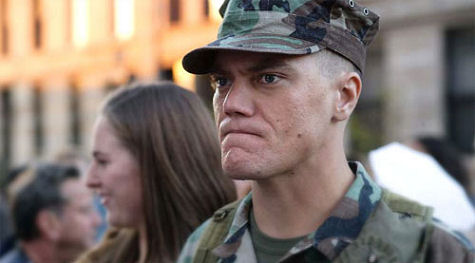
Michael Shannon as Dave Karnes
I have one very small quibble with World Trade Center and two mid-sized ones. A tinkling of piano keys at the wrong moment near the beginning, and two small but significant omissions in the portrayal of Dave Karnes, the ex-Marine who drove in from Connecticut on the afternoon of 9/11 and made it through the police barriers and onto the WTC site by dinner hour.
It was Karnes (portrayed by Michael Shannon) who discovered McLoughlin and Jimeno and brought the rescue teams to their aid. Everybody had quit looking that night for fear of other buildings collapsing. If Karnes hadn’t put on his Marine uniform and gotten himself a Marine haircut at a Stamford barbershop and driven down to Manhattan and all, it’s quite possible McLoughlin and Jimeno might not have survived. Shannon portrays him as a bit of a religious weirdo, a bit of a nut. But a good kind of nut in a situation like 9/11 — a guy who laser-beams right into what needs to be done, and then does it.
Curiously, Stone decided to omit a character detail that I find really interesting. Karnes drove into Manhattan in a recently purchased Porsche 911 convertible, and at times, according to a 9.02 Slate story by Rebeca Liss, at speeds of 120 mph.
That’s a fascinating trait for a 9/11 savior — tear-assing down the Connecticut Turn- plike and the Henry Hudson Parkway in a muscle car with the top down, and stop- ping at a McDonald’s along the way.
Why didn’t Stone show this? My theory is that he wanted Karnes to appear selfless and monk-like — a slightly bent military saint. And I think he knew this impression wouldn’t fly with audiences if he had Karnes driving a Porsche 911 because a lot of people think that guys who drive Porsches are dickheads. But I had read about Karnes and his Porsche two or three years ago and was waiting for that shot. I felt that Stone sold Karnes and his audience short by trying to simplify him into a ex-Marine who resembled Karnes in a lot of ways but not entirely.
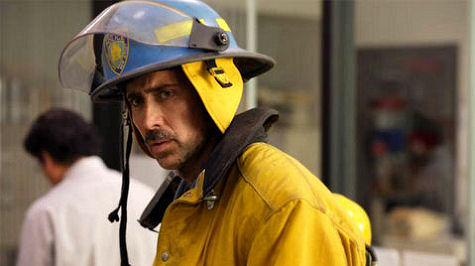
There’s another thing that happened between Karnes and the men he saved that Stone chose not to dramatize. It would have been touching. Liss describes it thusly:
“Karnes left the site that night when Jimeno was rescued and went with him to the hospital. While doctors treated the injured cop, Karnes grabbed a few hours sleep on an empty bed in the hospital psychiatric ward. While he slept, the hospital cleaned and pressed his uniform.”
The little thing I didn’t like is a bit at the very beginning when Cage is dressing and getting ready to drive to work from his home in New Jersey. The movie has been running for maybe four or five minutes as he walks down a hallway and opens a door and looks into the bedrooms of his sleeping children. And Stone ruins the moment by putting a “sensitive” little piano riff on the soundtrack. Sensitive as in “awww, he loves his children” and “boy, the quiet little moments in life are what make it all worth it, you know?”
Without the tinkling piano it would have been a nice honest little moment — with the tinkling piano it’s Hollywood bullshit. It’s okay to use tinkling piano riffs to emphasize emotion but only after the film has been running for 15 or 20 minutes, by which time you’ve built up your characters and plot elements a little bit.
There’s a perfect little piano tinkle when Gloria Stuart’s “old Rose” first looks at Jack Dawson’s old drawing of her naked younger self in Titanic, but because we’ve gotten to know a bit about her character and who she is, and because we don’t exactly know what the piano tinkle means…but we can tell it means something. And so it gets us on some level.
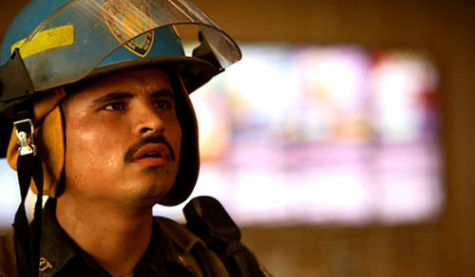
Michael Pena as Jim Jimeno
I seem to have lost my World Trade Center thread here….
At least I haven’t oversold the thing. If you go and feel this afterwards, blame Ansen and Time‘s Richard Schickel.
Addendum: I happened to meet Mcloughlin’s real-life son on the Paramount lot after seeing World Trade Center a couple of weeks ago. He was with a couple of friends in a small white car. We shook hands and talked about the film a bit. I asked if his dad has been in touch with Karnes since 9.11 and I think he said “once.” I asked why Cage portrayed his dad as walking in an awkward stumpy fashion at the end of the film, and he said it’s because the bones in his dad’s feet were totally crushed and aren’t flexible and that he basically “walks around like Frankenstein.”
